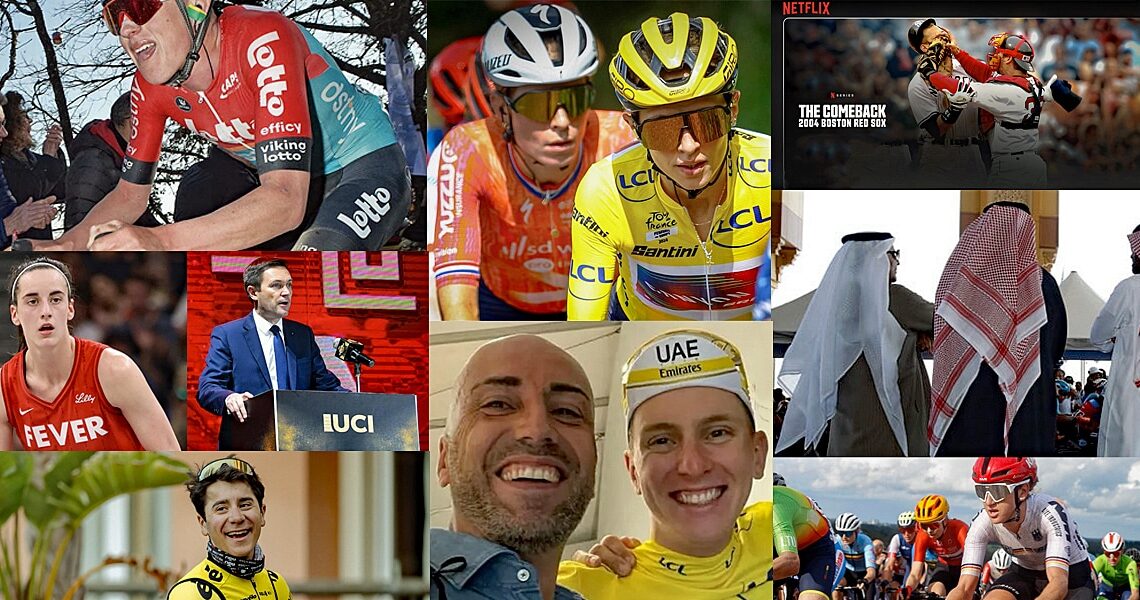
In this week’s AIRmail newsletter, The Outer Line takes an in-depth look at trending cycling news: Sports media investing, Lappartient continues aggressive IOC campaign, explosion in women’s sports, does cycling want PIF? More pressures for a budget cap…
# Catch up on pro cycling – and its context within the broader world of sports – with AIRmail … Analysis, Insight and Reflections from The Outer Line. You can subscribe to AIRmail here, and check out The Outer Line’s extensive library of articles on the governance and economics of cycling here. #
Key Takeaways:
- Sports Media Investments
- Lappartient Continues Aggressive Campaign for Top IOC Job
- The Explosion in Women’s Sports
- MBS Consolidates Control Over PIF
- Does Cycling’s “Winner Takes All” Attitude Support the Need for Budget Cap?

“The Comeback”
As a report in The Information this week pointed out, very few investors are currently looking to put money into the media sector – but sports are the one exception. The article reviews several small or start-up companies that are emerging to help replace regional historical cable channels, or to cover more specialized areas, like women’s sports. “Live sports remains a sure-fire way to attract a large audience on TV, which brings with it advertisers.” Recent examples include Amazon’s Thursday Night Football exclusivity, and Netflix’s recent deal for Christmas day football games and its live Jake Paul-Mike Tyson fight last week. Companies profiled included AllCity Network, aimed at in-depth coverage of local sports teams in selected metropolitan areas; FloSports, familiar to cycling fans, which covers a wide range of smaller niche sports, and; Meadowlark Media, focused on sports entertainment across live talk shows, podcasts, TV series and documentaries, perhaps currently best known for its series “The Comeback” – about the 2005 Red Sox – which it sold to Netflix.

What can women’s professional cycling take from its sisters in global sports?
Meteoric growth of women’s sports took center stage this weekend with the Orlando Pride’s NWSL championship win, and new investment and expansion in women’s soccer is now on a parallel track with the WNBA’s recent successes. What can women’s professional cycling take from its sisters in global sports to reach similar heights? In a wide ranging summation of this renaissance, the perception that women’s sports are a “charity” case has finally been discarded. The NWSL, much like the WNBA, experienced record fan attendance and viewership throughout the season, which bolstered new stadium construction, broadened profitable marketing and sponsorship deals, and spurred bidding for new franchises in large-market cities. Examples of this bullish outlook: the sale of Angel City FC (Los Angeles’ team) to Disney magnate Bob Iger for $250 million, at a massive profit for the original team investors’ $2 million franchise fee; and the launch of Bos Nation FC, which will begin play for Boston in 2026 in a purpose-built stadium in one of the U.S.’s most sports-fixated regional markets. From an investment perspective, more celebrity investors and established funds seem to be flocking to the league as well.

Caitlin Clark’s record-breaking entry into the WNBA has elevated attention on the league’s competitive product
The NWSL and WNBA correctly anticipated how women’s sports personalities can tap into pop culture through enhanced media presence. For example, Caitlin Clark’s record-breaking entry into the WNBA has elevated attention on the league’s competitive product just as its media rights and player collective bargaining were up for renewal. The NWSL’s growth has been more organic, using its star power to drive up demand for the regional “product” ‒ ticket sales and access to high quality broadcast content, both of which led to the league’s new $240 million (primarily Amazon, CBS, and ESPN) broadcast agreement. So, should the Women’s cycling WorldTour (WWT) look towards the NWSL’s market-engagement model? That might not be practical, as cycling teams based on “regions” are historically susceptible to changes in fan loyalty for any particular star rider who might transfer to another team on a whim.

Demi Vollering dramatically lost the Tour de France femmes due to a crash, injury, and team politics
We believe the smart bet is to build interest and cultural relevance through the sport’s star riders and rivalries ‒ a narrative that is driving the WNBA forward ‒ but we again lament the sport’s lack of dedicated broadcast coverage to help drive that strategy home to new fans in new markets. NWSL commissioner Jessica Berman said of the WNBA’s successes, “You have to create stars. You have to help fans relate to these incredible athletes.” The rivalries which have developed in the Women’s WorldTour feed into a dramatic narrative that will almost certainly ignite on the road in 2025 ‒ whether in the Classics or grand tours. Revelations shared by Demi Vollering about her final season in the SDWorx team ‒ dramatically losing the Tour de France femmes due to a crash, injury, and team politics ‒ highlight the competitive and interpersonal conflicts which can elevate a sport from niche mediocrity to global awareness and fandom. Women’s pro road cycling has the sport’s greatest growth potential, if only it could prioritize that opportunity.

UCI President David Lappartient wants to be President of the IOC
UCI President David Lappartient continues to aggressively promote his candidacy for President of the IOC in various forums. This week, in a fawning article from Inside the Games entitled “The Key Man in French Sports,” Lappartient is described as “cool-headed and young,” and possessing a “blend of administrative and political expertise (that) makes him a compelling option for the role.” According to this report, Lappartient also pats his own back for “calming tensions” within the French sporting community prior to the Paris Olympic games and suggests that “he brought stability to the cycling community, as demonstrated last Friday at the AIOCC General Assembly.” Other inside sources continue to point out that although Sebastian Coe, the former British track star, sports administrator and Parliamentarian remains perhaps the best qualified and the favorite for the spot, he has tangled in the past with retiring President Thomas Bach. Bach himself seems intent on installing the former Zimbabwean swimmer but largely invisible Kirsty Coventry to the top spot, who, if elected, would become the first woman head of the IOC. Both Coe and another other leading candidate, Juan Antonio Samaranch, Jr., would both have age restrictions in terms of serving for the maximum number of terms, assuming changes are not made in the rules; in addition, several of the candidates, including Lappartient, have complex situations in terms of their current roles and maintaining proper IOC membership in the event of winning the election. Hence, some observers have suggested that internal rules and political chaos could end up favoring Lappartient’s candidacy, with elections scheduled next March, in Greece.

The rumored investment from PIF didn’t happen… yet
Although the widely-ballyhooed One Cycling Project has never come to pass, cycling fans will recall that one of the project’s rumored investors was PIF – the public investment fund, or sovereign wealth fund of Saudi Arabia, which was reportedly poised to throw €250 million at the project. A new report out this week from Human Rights Watch, entitled, in part, “The Man Who Bought the World,” details the evolution and gradual control of this fund by Mohammed bin Salman, known as MBS – the “crown prince, prime minister, PIF chairman, and the de facto autocratic ruler of Saudi Arabia.” The fund has gradually transformed from an obscure and conservatively managed sovereign wealth fund to one of the world’s largest and most aggressive investment engines, valued at almost $1 trillion. The report suggests that MBS has consolidated personal control over the fund, and that he has “few, if any, constraints on how he deploys his nation’s wealth meant to benefit the entire Saudi people.” The report painstakingly draws parallels on MBS’s rise to power alongside Saudi restrictions on human rights and civil society. Already involved in a number of different sports-related initiatives intended to whitewash or greenwash autocratic policies, it is clear that the PIF intends to continue controversially building its presence in international sport. A quick scan of the 100-page report makes it pretty clear that perhaps cycling dodged a bullet, though – in apparently not meeting the fund’s minimum investment requirements.
(Notably, the nominal leader of the Public Investment Fund, its Governor Yasir al-Rumayyan – who has been the public face in the LIV golf spectacle over the last couple years, and who is also the Chairman of Newcastle United football club in England – was reportedly photographed last week with U.S. president-elect Donald Trump and erstwhile advisor Elon Musk in New York City at an Ultimate Fighting Championship – another sport where PIF is reportedly evaluating further investments among many others named in the report.)

Will Van Gils break his Lotto contract?
Despite the UCI’s attempt over last off-season to create tougher transfer and recruitment rules to dissuade teams from stealing riders that are already under contract, the trend only appears to be accelerating. Most recently, Lotto-Dstny’s young star Maxim Van Gils, their second-highest UCI point-generating rider in 2024, is set to leave the team despite committing to them through 2026 earlier in the year. The UCI’s rules don’t allow teams to recruit riders currently under contract without the permission of their current team, with hefty fines for breaking these rules. However, under European law, which treats riders just like any other professional employee, riders and/or teams are essentially free to unilaterally end a contract if they pay out the remaining value of their deal. This means that a rider like Van Gils, who is potentially making roughly €750,000 per season under his current deal, would still be incentivized to leave if a team signed him for his true market value, which could be as much as €2 million per season. In this example, even if Van Gils paid out the remainder of his contract, or €1.5 million to Lotto, he would still net an additional €2.5 over the same timeline.

Cian Uijtdebroeks made a mid-contract move
If this situation sounds familiar, it is worth noting that Van Gils recently signed with Alex Carera’s A&J Allsports agency, who engineered Cian Uijtdebroeks’ mid-contract move from Bora-Hansgrohe to Visma-Lease a Bike last year. While that move hasn’t worked out in Uijtdebroeks and Visma’s favor so far, it certainly increased his agent’s commission due to a higher salary. This may suggest that we will continue to see the sport’s top young talents funneled away from smaller-budget squads into the arms of cycling’s super-teams, which have the financial muscle to offer bigger deals to riders, and, in turn, siphon fatter commissions to their agents. This may be another reason to examine more carefully some of the budget cap discussions that are currently floating around the sport.

Alex Carera – the man behind the contract moves and his top earner, Tadej Pogačar
This migration toward a “winner takes all” environment in professional cycling has been the source of significant consternation in the media, with many predicting cycling is rapidly beginning to mimic the world of soccer (football), where the biggest clubs pay massive buyout fees to procure under-contract top talent from smaller clubs. And often, these smaller teams are more than happy to take the windfall to fund their search and development for other new talents to keep the business model in perpetual motion. Soccer’s ecosystem creates an upper tier of clubs that win trophies and an underclass that can create sustainable businesses with their talent identification and development capabilities; however, cycling may be at a disadvantage because it has no structures to provide financial security for smaller teams even if they can monetize the identification and development of young talent. Interestingly, while cycling lacks codified rules to provide this security, this specific situation could actually benefit Lotto ‒ a team facing a multi-million euro budget shortfall due to the departure of co-sponsor Dstny ‒ in the long-term. Striking Van Gils off their books at what is likely near the high point of his value, while simultaneously being compensated in cash for the remainder of his deal, could allow them to balance their budget and procure more talent before a likely WorldTour return following the 2025 season.

‘Selling’ Van Gils could help Lotto’s bank balance
# Catch up on pro cycling – and its context within the broader world of sports – with AIRmail … Analysis, Insight and Reflections from The Outer Line. You can subscribe to AIRmail here, and check out The Outer Line’s extensive library of articles on the governance and economics of cycling here. #
The post Sports Media Investing, Lappartient IOC Campaign, Explosion in Women’s Sports, Does Cycling Want PIF? And a Budget Cap appeared first on PezCycling News.



